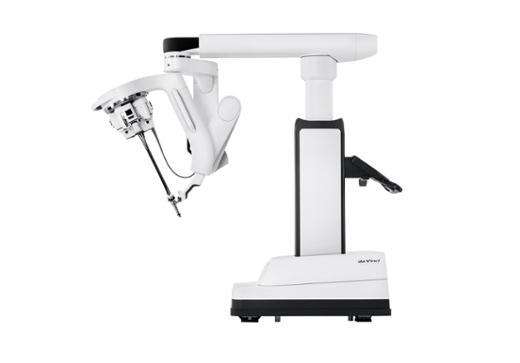ATLANTA – Certain head and neck cancers, along with prostate and other urologic cancers, can now be treated in a less invasive way using new technology during robotic-assisted surgery at Emory University Hospital Midtown. With the help of a new single-port (SP) robot, only one small incision is needed to treat these patients, thanks to improved instrumentation, camera angles and a new design. The single-port da Vinci robot, made by Intuitive, is the first of its kind in the metro-Atlanta area and only the second in Georgia.
Robotic-assisted surgery is performed when the surgeon sits at a console near the patient and operates through a small incision using the robot’s instruments. The da Vinci system translates every hand movement the surgeon makes in real time to bend and rotate the instruments with precision during the procedure. The surgeon also controls a camera for viewing the surgical area, which is magnified with a high-definition 3-D view.
“The single-port robot is the first iteration of a device geared towards ear, nose and throat (ENT) procedures,” says Mihir Patel, MD, associate professor in the Department of Otolaryngology, Emory University School of Medicine and director of transoral robotic surgery at Emory University Hospital Midtown. “It contains smaller profile instrumentation to go into the mouth and other small areas and can more efficiently and effectively be manipulated to remove tissue. The 3-D camera also pivots to allow for 360 degrees of rotation and top-notch viewing of the surgical area.”
Patel, who is a member of the Winship Cancer Institute of Emory University, the only National Cancer Institute-designated comprehensive cancer center in Georgia, goes on to say, “This new technology will allow us to innovate and approach procedures in a different but safe way without being limited by the instrumentation.”
Patel will use the single-port robot to assist in surgery on tonsil cancers, tongue-based cancers and deep skull-based masses, among other procedures. The device has been FDA-approved for certain ENT cases through the mouth.
The single-port robot will also be used for urologic surgeries at Emory University Hospital Midtown.
“The single-port platform will be useful for prostate surgery as well as cancer and reconstructive operations of the kidney and bladder, as the design will allow us to offer robotic surgery to more patients who otherwise may not have been good candidates with prior robotic platforms,” says Adam Lorentz, MD, assistant professor in the Department of Urology at Emory, medical director of Emory Clinic Urology at Emory University Hospital Midtown and member of the Winship Cancer Institute. “The SP robot allows surgeons to take less invasive approaches and thus has the potential for lower complications, quicker recovery and better aesthetic outcomes.”
The SP robot has been FDA approved for many urologic procedures.
“With the building of the new Winship at Emory Midtown facility, our surgeons and cancer experts will use the SP robot to deliver state-of-the-art treatment to patients with head, neck and urologic cancers,” says Daniel Owens, CEO of Emory University Hospital Midtown. “It’s truly the honed skills of our internationally renowned experts in head and neck cancers as well as our experts who specialize in urologic cancers that – when combined with these latest technologies – help us deliver better options, improved outcomes and more hope to our patients. We are pleased to be the only site in metro-Atlanta to provide this unique treatment.”
“Provision of the SP platform demonstrates ongoing commitment by Emory University Hospital Midtown to cutting edge technology and treatments for our patients, and contributes to a breadth of services at Emory Healthcare unmatched by hospitals and health care systems anywhere in the region,” says Lorentz.
The new SP robot will also afford the opportunity to help train the next generation of head, neck and urology surgeons.
“As an academic medical center, having this new instrument will allow for more effective teaching of our medical students, residents and fellows,” says Patel. “They will be able to learn valuable skills on this new minimally invasive platform, while providing safe, high-quality care for cancer patients.”

